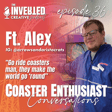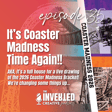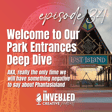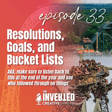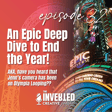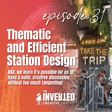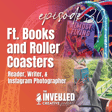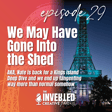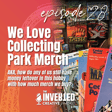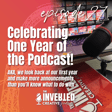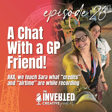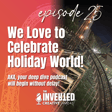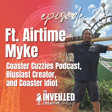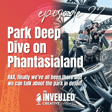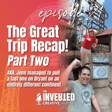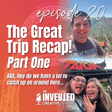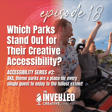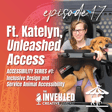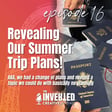Become a Creator today!Start creating today - Share your story with the world!
Start for free
00:00:00
00:00:01

Ft. Richard Pretlow, Park President for Morgan's Wonderland in San Antonio, TX
We were thrilled to talk to Mr. Richard Pretlow for the finale of our accessibility mini-series! Morgan's Wonderland focuses on accessibility and inclusion for individuals from all walks of life to enjoy a day at the theme park. We touch on the Morgan's properties mission, Richard's theme park history, the most rewarding and most challenging parts of a park like Morgan's, innovations and creativity in accessibility, and more.
You can learn more about Morgan's Wonderland—as well as all of the properties on their campus—at https://morganswonderland.org/
Transcript
Introduction and Guest Welcome
00:00:00
Speaker
You are listening to the Inverted Creative Podcast. I'm Allison. I'm Bryant. And I'm Jen.
00:00:16
Speaker
Hello everyone. Welcome back to the inverted creative podcast. We are super excited to have a special guest with us today from Morgan's Wonderland in San Antonio, Texas, the park president, Mr. Richard Pretlow. Hey Richard.
00:00:31
Speaker
Hey there. Thank you for having me. It's a really great opportunity. Yeah. Thank you so much for spending the time with us
Morgan's Wonderland and Inclusive Design
00:00:37
Speaker
today. to start off, would you want to give listeners a quick overview of kind of the Morgan's properties and your history with joining them?
00:00:44
Speaker
Sure. Of course. So, ah Morgan's, you know, we're so much more than just a theme park. You know, of course, it all started with Morgan's Wonderland our Park, but we have Morgan's Inspiration Island, which is our splash park. We have our multi-assistance center, ah which is designed to allow folks with special needs to see all of their doctors in one location.
00:01:05
Speaker
ah We have the Morgan's Camp. We have the Morgan Sports Center. and the Morgans Hotel will be coming online soon. So ah there's really a lot of cool stuff going on. And the inspiration behind everything you see ah is who we're named after Morgan.
00:01:20
Speaker
Morgan is Gordon Hartman's daughter. He is the founder and he is the chairman of all things Morgans. So Morgan was born with physical and cognitive special needs.
00:01:32
Speaker
And believe it was 2006, maybe
00:01:38
Speaker
ah Gordon, his wife and Morgan ah were visiting a very popular resort in Orlando that'll be nameless. um But Morgan, you know she's very tall. She's six foot four. And at the time she was non-speaking she wanted she saw some kids in a pool playing with a ball and she approached those kids and ah Those children just not knowing how to interact with someone who is as tall as Morgan, someone um you know who's non-speaking and Morgan speaks now, by the way, she speaks beautifully. She even sings, too.
00:02:10
Speaker
but ah But those kids not knowing how to interact with someone with with special needs and disabilities, ah they very quickly grabbed their ball and they got of pool. ah So Gordon wanted to create and build a place where people of all abilities can play together. So what makes our park so unique is that we are not just for folks with disabilities or special needs.
00:02:33
Speaker
We are for everybody. So we have... the first and what I believe is the only wheelchair, fully wheelchair accessible carra carousel ah in the world. And what's so cool about it is um we don't want folks who have disabilities or special needs to feel like they're in a device that's somehow weird or different.
00:02:55
Speaker
ah So if you look at our carousel or our Ferris wheel or any of the rides that we have, The wheelchair accessible gondolas look like they're supposed to be there. They don't look any different than any of the other gondolas, but they're fully wheelchair accessible. That's what makes Morgan's so unique. That's what makes this park so unique. And that's what makes the services that we do just so great.
Accessibility Inspiration and Industry Experience
00:03:17
Speaker
I love it so much. You know, like we were inspired by Morgan's pretty early on and we wanted to do an accessibility miniseries on the podcast. So we've talked um about service hand service dog handling at parks. um We did a little deep dive about accessibility with one of our coaster enthusiast friends who has a disabled brother and his experience is there.
00:03:37
Speaker
So it's really exciting to get to learn more about Morgan's. We want our listeners to kind of get a better perspective of everybody else who can experience theme parks just as well as them. Yeah, yeah, totally understandable.
00:03:49
Speaker
Curious, are you a theme park and roller coaster fan yourself? Well, ah I think to be a park general manager, to be a park president, I mean, you you really have to love theme parks. So being here at Morgan's, this is not my first stint in a theme park. I've been doing this now for, ah this is year 16 going on year 17.
00:04:13
Speaker
I started at Bush Gardens in Williamsburg, Virginia, went on to Sesame Place. I've worked with Crayola Experience ah right when they were getting there. You know family entertainment centers off the ground.
00:04:27
Speaker
Spent some time a Six Flags Great Escape in Lake George, New York. Was the president ah for a while at Six Flags America, which is unfortunately a closing. Very sad story. We'll save that for another podcast.
00:04:38
Speaker
I was the VP of Revenue at SeaWorld San Antonio and then three years ago took on this opportunity here at Morgan. So ah my entire professional career has been in theme parks. So ah yes, I would say I'm very much so a roller coaster theme park ah nerd.
00:04:56
Speaker
What's your favorite roller coaster? Yeah, we have to ask. that's ah That's a really, complicated and that's like somebody asking me my favorite movie. I usually go by genre. Um, my absolute favorite roller coaster is, um, the Loch Ness Monster Busch Gardens Williamsburg, just because of the significance of that, that roller coaster. That was, um, the first roller coaster that I ever got on.
00:05:21
Speaker
I was five years old. Uh, and my dad told me it was a monorail. And, you know, soon as, uh, they dropped that harness over you and you started to go up the track and you hear the click clack of the anti-rollback, you're like oh, this ain't no monorail.
00:05:35
Speaker
um But yeah, that that one is probably my absolute favorite. But I had many just in you know different categories. Right. Yeah, my sister tricked me onto Tower of Terror when I was five years old. So I understand that very well.
00:05:50
Speaker
I really liked roller coasters at all. Oh, yeah. We we love them. Yeah, I feel like that's always got to be my my first experience. I was... um I was um prompted to get on with the promise of a Care Bear.
00:06:06
Speaker
um It happens to all of us. It's like a rite of passage
Accessible Ride Collaboration
00:06:11
Speaker
almost. Exactly. we need Everyone needs to start somewhere. Oh, yeah.
00:06:19
Speaker
All right. So um moving over a little bit to the actual design and experience of the park, how much do you work with the ride manufacturers when you're building things for the um park and area designers when you develop the accessible options?
00:06:35
Speaker
ah So we work. extremely close with the ride manufacturer when we are thinking about designing, installing, purchasing a new ride.
00:06:47
Speaker
ah Because for many ride manufacturers, you know, what's interesting is Gordon often tells a story about um when he was first coming up with the idea for the park.
00:06:58
Speaker
He visited the IAAPA Expo in 2007. And when he brought up the idea of a wheelchair accessible ride, a wheelchair accessible carousel, he says that most folks laughed him out of the room.
00:07:13
Speaker
um And now here we are in 2025, Gordon is actually in the IAAPA Hall of Fame. um So, you know, it's it's his curiosity is his question asking.
00:07:24
Speaker
It's his candidly some of his aggression around things ah that really pushes that really pushes the envelope. But, you know, we don't just go to a ride manufacturer and say give us that.
00:07:35
Speaker
We want to be very involved in the process because it's not just about. accessibility for wheelchair users. But you know what about folks who have low vision? What about folks who have low hearing?
00:07:48
Speaker
What about folks who get easily overstimulated? What about all those folks? And then to take it a step further, it's not just about accessibility for the guest, because we talk a lot about accessibility for our guests.
00:08:02
Speaker
It's about accessibility for our team members as well.
Team Inclusion and Design Philosophy
00:08:06
Speaker
About 20% of our team members actually identify as having a special need or disability. So outside of the ride itself, even the ride control panel,
00:08:17
Speaker
the safety zones, the um yeah everything that we do about that ride, team member, guests, maintenance related is all built around accessibility and inclusion, because believe it or not, we have ride operators who are in wheelchairs.
00:08:38
Speaker
um And there are a lot of rides out there that, you know, typically use a foot pedal as a dead man switch. But, you know, if we have someone who's in a wheelchair, they're not able to use it. They're not able to use a foot pedal. So those are things that we have to think about and say, how does a wheelchair user how are they able to still operate this ride? Because what was critically important for us?
00:08:58
Speaker
is ah representation matters. And so we have a lot of guests who come through the park who you know many have never many have never been here before. But when you see somebody who looks like you, when you see somebody who identifies with the same ah disabilities, same special need as you do, that can be inspirational ah because there are a lot of people who come here not realizing that, oh, I'm in a wheelchair, but I can actually operate that ride too.
00:09:27
Speaker
I can work in that food service stand. I can, you know, so I can do all the things because, you know, of the challenge for the theme park world is that when, and I can say this having been a traditional operator, we see somebody with special needs or disability and our default is put them in janitorial.
00:09:45
Speaker
um But being here at Morgan's has shown me and has taught me that um if they want to go to janitorial, they can, but they can do so much more. So it's a very large, encompassing thought process.
00:10:01
Speaker
I know I kind of went around the Marlboro bush a little bit, but it just there's just so much that goes into it. It's not just about the guests, the team and you know the the whole experience.
00:10:11
Speaker
Such a good philosophy. yeah I love it. So do I. It's it's incredible. Coming off of this, and um this is going to piggyback off of some of your other experience as well.
00:10:24
Speaker
How much more involved with the design, like with the entire design process are you with Morgans than you were at like other parks that you worked with in the past?
00:10:35
Speaker
um I would say pretty well involved in the design process. The the difference between the design process here and the design process at you know a SeaWorld or a Six or or another one of those establishments is that here, except we have to think about accessibility first versus at other places, we're thinking about throughput first.
00:11:00
Speaker
We're thinking about, okay, how big is how big can we make the queue line? um You know, how many riders can we get through per hour? Now, those are things that we are concerned about here at Morgan's. You know, we you know, we don't want people waiting in long lines. We want to efficiently design queue lines.
00:11:16
Speaker
ah But for us, accessibility is the is the first design philosophy that we think
Innovative Thrill Rides and Safety Limits
00:11:22
Speaker
about. And so everything we have in the park was actually designed by one gentleman. His name is Robert Luna, and um he was actually an architect.
00:11:32
Speaker
for Gordon when Gordon was running his home building business. So he's been very involved and very entrenched with the mission and philosophy of Morgan's ah since day one.
00:11:45
Speaker
And really every facility that you see on the Morgan's campus Everything from the park, the water park, the camp, sports, the multi-assistance center, even the hotel that's coming online.
00:11:58
Speaker
um His deep knowledge and his deep understanding of accessibility and inclusion, he's been our primary designer of choice. Oh, that's awesome. Yeah.
00:12:09
Speaker
So thinking about like rides that you guys want for the future, potentially from Oregon's, this is a question posed by a friend of the podcast, Mike. He had said, if you could work with any ride manufacturer to build and develop an accessible ride for the park, who would it be and what ride type do you envision?
00:12:26
Speaker
Well, um I'll answer that question in two ways. um We've worked with a lot of different ride manufacturers. I'll say the manufacturer that um we've worked the best with, the manufacturer who has delivered the most for us, and the manufacturer who has made it clear that they are very committed ah to accessibility and inclusion, that is Zamperla.
00:12:53
Speaker
Okay. And so before Mrs. Zamperla's father passed away, and I think it was 2020 2021, mean, they made a very bold commitment to accessibility and inclusion.
00:13:04
Speaker
i mean, Zamperla has been designing wheelchair accessible rides since the early 2000s. So this is not it's not a new concept ah for them, but we work very closely with them.
00:13:17
Speaker
You know, we've learned things from them. They've learned things from us. And I believe I can say that, you know, we've seen improvement in the industry as a whole because of the relationship that we have.
00:13:29
Speaker
ah But to go back to the original question, what type of ride would I like to see? um If you look at our portfolio of rides, we have traditionally been geared towards ages two to 12.
00:13:43
Speaker
and um But we have a lot of special needs children who at some point are going to be a special needs adult. um Same ah you know for the disabled community.
00:13:56
Speaker
ah Not everybody wants the kiddie ride. Some people want something that's a little more ah that's a little more thrilling. So over the next couple of years, we are going to look for ways to strategically, to safely, ah always with the concept and idea of accessibility and inclusion to increase the thrill.
00:14:18
Speaker
ah Maybe that's a roller coaster. Who knows? or Maybe it's some sort of tower ride or, you know, something. that's got a little more speed to it. ah But we are going to look for ways to up the thrill.
00:14:30
Speaker
um Won't say any manufacturers specifically. I mean, you look at the landscape of attractions, I mean, Intamin, RMC, Huss, I mean, Zaire, I mean, Premier Rides, I mean, you name it. There's so many good manufacturers, so many good engineers out there. I mean, it's just incredible the stuff they do and the stuff they come up with.
00:14:53
Speaker
um I don't know if all of them are ready to take a dive into accessible rides ah and attractions because there is a lot of engineering that goes into it um that some manufacturers may not have the capacity for, some of them may not have the time for, but a lot of great folks out there. And I think our mission matters to all of them, but sometimes it's a matter of bandwidth, whether they can you know actually meet our needs or not.
00:15:22
Speaker
Makes sense. ah well I love that about Zamperla. actually didn't know how involved they were with everything. That's fantastic. Oh, yes. they They're very involved. And, um you know, if you you can look at examples that give kids the world in Orlando. They they actually have many of the first generation ah wheelchair accessible rides that Zamperla ever designed.
00:15:46
Speaker
um So their version of the, um we call it the magic bikes here, I think in I think Give Kids the World, I'm not sure what they call it. Maybe theirs is the Wonder Bikes.
00:15:58
Speaker
But either way, the the two Zamperla attractions they have are actually prototypes that Zamperla designed, engineered. And when they got done with them, they actually donated them to Give Kids the World. Oh, wow.
00:16:09
Speaker
Oh, I didn't know that. That's incredible. Mm-hmm. Yeah, that's definitely something I had no idea Sam Perlow was so involved with. buts Oh, yes. All right, so we've talked about some of the like the good things about running the park, some of the things that are really enjoyable, and the design process.
00:16:26
Speaker
What do you think the biggest challenge of running a park based solely around accessibility or around inclusion, i should say? So the challenges with inclusion is We try to include everybody, but the reality is not everybody's going to be included. um And I'll give you a couple of examples.
00:16:50
Speaker
um In the theme park business, you ask any general manager, any park president, a any executive that has ever run a park for 10 minutes and ask them what their number one priority is, they will tell you safety.
00:17:07
Speaker
And if they tell you anything else, get out of that park as fast as you can. ah But safety is our number one priority. And so the reality is, um while we do our best to accommodate as many special needs, as many disabilities as we can, we can't accommodate everybody.
00:17:27
Speaker
ah So, for example, um you know, we have some folks who arrive in extremely large and heavy wheelchairs. um Some of our rides just simply cannot handle wheelchairs that are 500 plus pounds.
00:17:44
Speaker
And for a lot of these folks, ah their wheelchair is part of their body. So as they can't get out of it. They can't transfer. That would be very uncomfortable, ah very uncomfortable for them. um So it's one of those things where it it makes it a very difficult discussion.
00:17:59
Speaker
Like, hey, your chair is too large for this ride. Or even some cases we have folks where the the The physical nature of their chair appears to be in a great state of disrepair. It's like, hmm, unfortunately, because of this, the nature of this, the nature of this ride and because of the status of your wheelchair, um this is not a ride you'll be able to enjoy to today. Now, we always try to divert folks to rise in attractions that are for them.
00:18:33
Speaker
um But there are some rides that, you know, we we just don't. we We try to get as much stuff as we can, but we're never going to be able to. I mean, when you when you think about the world of special needs and disabilities, I mean, it is enormous.
00:18:50
Speaker
it's It's referred to as a minority group. But I mean, you think about it, it is just enormous. And it is one of the only minority groups in the world that at some point all of us are able to
Personal Stories and Mascot Symbolism
00:19:02
Speaker
join.
00:19:02
Speaker
i mean, we live long enough. All of us are going to be impacted by some sort of special need, whether it's mobility, vision, hearing, you know whatever the case may be. And so, again, we we do our best, but we know we're not we know we know we're not able to accommodate um all the things.
00:19:19
Speaker
Yeah, absolutely. Very true. Kind of on the flip side of that, thinking going from, you know, kind of the potential downsides to the the positives of what we're doing for the industry.
00:19:33
Speaker
What is one of the best moments you've seen where accessibility or inclusion truly changed the guest day for the better? Absolutely. So this is one of my this is one of my most favorite stories. It's the one that I tell the most.
00:19:46
Speaker
And it's from when I first started back in 2023. So it was March and we had just opened. we may We may have been open for a couple of weekends. And in the front of our park, we have a butterfly playground. It's two very large playgrounds. Very nice. i mean, beautiful playgrounds of shaded and everything.
00:20:07
Speaker
And um there was a gentleman who was in a motorized wheelchair and he was kind of off to the side and he was crying. And, know, approached him and I didn't know what was going on. You know, i was like, sir, know, there's something I can help you with, you know, loss can i help you find your family.
00:20:26
Speaker
And he said, no, I'm just really happy. i was like, oh that's that's wonderful. And learning more about him, yeah he had been in the military for many, many years.
00:20:41
Speaker
And on his last deployment is when he became disabled. And he was permanently put into a wheelchair. um Most of the left side of his body was severely damaged to the point where he could not use it.
00:20:56
Speaker
And he didn't have a lot of good mobility on the right side of his body. And what he said was, you know, what's unique about our playground is that if you look at it real quick, it looks like any ordinary playground.
00:21:09
Speaker
um And that's because it is an ordinary playground. ah But the when you really look at it, it is so wide that two wheelchairs can actually pass by each other at the same time.
00:21:21
Speaker
And he said that for the first time since he's been back. Well, I'll back up. His son was born while he was deployed. and So he did not even witness the birth of his son. and so when he came back, he came back to the United States.
00:21:36
Speaker
You know, unfortunately, he came back disabled and he was not able to interact with his son very much. And being at Morgan's on the butterfly playground, he said, was the first time that he was able to actually play with his son.
00:21:49
Speaker
Because the the housing development that they lived in, you know, there was a playground and his son was able to play on it, but he couldn't play with his son. He had to sit off at the side because the playground was surrounded by sand, which, you know, playgrounds are traditionally surrounded by sand. But if you're in a motorized wheelchair, like it's not an all terrain vehicle, it can't go in the sand.
00:22:12
Speaker
um But he came here and he was able to play with his son for the first time. That just had a really dramatic impact on him that I know I will always remember. And I certainly believe he will always remember for the rest of his life as well. probably his son will remember too.
00:22:27
Speaker
Wow. Jen looks like she's about to cry. you know. It's a really beautiful story. I really i really like that one. Yeah, it's it's it's a good story. It's really special.
00:22:38
Speaker
to And especially coming like, i I think of stories like that and I would i wouldn't expect something like the playground um to trigger such an emotional story.
00:22:55
Speaker
it's It's really beautiful. I know the butterfly is a meaningful kind of mascot for Morgans. What's the reasoning behind that? The butterfly has become the symbol of inclusion for Morgans. And you have to remember our inspiration is Morgan and she loves butterflies.
00:23:17
Speaker
ah So the butter it just it just was natural for the butterfly itself, Joy the butterfly to become our
Water Park Features and Child Safety
00:23:24
Speaker
mascot. Now, what's interesting about the butterfly and the butterfly playground is that if you look at a Google Earth or Google map image of the park,
00:23:35
Speaker
ah The butterfly playground is actually in the shape of a butterfly and all the shade sails represent the wings. it's ah It's a very cool image that you see from the top down if you're looking at a Google map image.
00:23:47
Speaker
I will have to go look at that. That sounds awesome. Yeah, that's really that's a really cool design add in there. We're going to move back over to some um design features.
00:24:00
Speaker
choices here. What has been some of the best innovation that you've seen for um the aclusive inclusive design, either at Morgan's or anywhere else that you'd love to implement?
00:24:12
Speaker
um Some of the best innovation.
00:24:21
Speaker
I'm going to try to keep it Morgan to keep it to morgans there so much that we and okay
00:24:30
Speaker
In our water park, ah Morgan's Inspiration Island, we, um you know, if you're a wheelchair user, um you know, I honestly had no idea before coming here how much wheelchairs cost. It's not really something that you you think about.
00:24:47
Speaker
They can be anywhere from a few hundred to a few thousands. with some of the more specialized chairs ah being $25,000, $30,000, $35,000. what's what's interesting is you ask yourself, how does someone who wants to come to our water park and get wet and enjoy you know a water park in the San Antonio heat, how do they enjoy themselves if they're in a $35,000 motorized chair with a battery and all these electronics on it?
00:25:19
Speaker
Well, we here at Morgan's actually have pneumatic powered chairs ah that we actually loan out to folks who want to enjoy our water park but don't want to damage their chair.
00:25:32
Speaker
ah These were designed by students at the University of Pittsburgh, and they are 100 percent. Air powered chairs has a joystick, much like a motorized wheelchair, has all the the features and whatnot of a motorized wheelchair, but it has no electrical components.
00:25:51
Speaker
It is 100 percent air powered so it can get not only can it get wet it can actually get submerged in water and be perfectly fine because it has two very large scuba tanks, ah scuba diving tanks that are underneath the seats that actually ah power. That is probably one of the most innovative thoughtful, intriguing, unique designs that I've seen since I've been here.
00:26:17
Speaker
um We we've certainly got a ah whole plethora of very unique design things, but that the chair itself, the the design of the chair and the fact that you can really use it anywhere and get completely submerged and that way you're still included in the experience, I think is is some real innovation. Because when you think about you know the word innovation, actually, somebody actually asked me this the other day.
00:26:42
Speaker
You know, when you think about innovation, the the definition of innovation is taking something that already exists and representing it in a way that the world has never seen before. And the good example of that is the iPhone.
00:26:55
Speaker
you You know, cell phones existed before 2007. Cell phones with Internet existed before 2007. But then boom, 2007, the iPhone comes out and it completely revolutionizes.
00:27:06
Speaker
the industry. That's really what innovation is. They took two things that already exist and put it together. you know, we took scuba diving tanks and we took a wheelchair. We put it together and we made a motorized wheelchair that doesn't actually have a motor on That is so cool.
00:27:20
Speaker
I'm sitting here just like, wow. Because I know um on our last episode, like we were looking a little bit at the Morgan's website um and seeing the Inspiration Waterpark and just thinking how cool it is to have an inclusive waterpark. hear about those wheelchairs is just mind blowing.
00:27:36
Speaker
And you know, what also makes our water park unique is that um so we just feature splash pads at our park. Like there's no wave pool or, you know, pools to swim in. and for some folks that may be off putting, they say, well, you got water parks, you don't have any place to swim.
00:27:53
Speaker
But if you think about it through the eyes of a parent and you have a special needs or disabled child, ah they're usually either not a strong swimmer or they're not a swimmer at all.
00:28:05
Speaker
Now, if we just have splash pads, there is nowhere for your child to drown. So the anxiety of going to a water park with the potential of, you know, your child drowning or ingesting a lot of chlorinated water, um that fear doesn't exist here. So I think that and that anxiety that a lot of parents have when they go to Aquatica or Hurricane Harbor any of the other really fantastic water parks out there ah that doesn't exist here at Inspiration Island.
00:28:34
Speaker
Yeah, I think of splash pads, and I feel like that is, I know we talked about like rites of passage earlier. it kind of feels like another rite of passage for kids to just play in a splash pad. ah I think I have pictures of me playing in the one at Epcot when I was five years old. no The you know new Epic Universe also has one, and just having something accessible for everybody.
Improving Accessibility at Other Parks
00:28:54
Speaker
and Definitely.
00:28:56
Speaker
So I know you have worked in other theme parks, not necessarily in the same role, but yeah I know you have an understanding of how you know, kind of the mainstream larger parks operate, knowing what you know now, what do you think those parks can do better in areas of accessibility and inclusion?
00:29:13
Speaker
Sure, sure. So it's it's easy, but challenging all at the same time ah because, you know, Morgan's 15 years old. It's still relatively new.
00:29:30
Speaker
It was built with accessibility in mind and accessibility first. But many of the parks that I've worked in, actually most of the parks I've worked in, um were actually built in the 70s and 80s when accessibility and inclusion was just not a thing.
00:29:46
Speaker
I don't even think ADA a was a thing at that at that point. ADA did not come about until the late 80s, early 90s under um ah George Bush, the original, ah not the original George, but George Bush's father.
00:29:59
Speaker
um And then there are a couple of parks out there that I've even worked in that were built in the 50s and 60s. And accessibility and inclusion really was not a topic of discussion then.
00:30:09
Speaker
ah So it's a little bit more challenging for those folks. um But it's simple things that you can do. And it it's starting with looking at the guest experience.
00:30:21
Speaker
Most folks experience your park before they actually get there through the website. So ensuring that your website is fully accessible and that includes the font, the colors, the way that things move in and out of the screen, all that, um you know, target targets accessibility for guests, especially those who have visual, um you know, visual impairments.
00:30:47
Speaker
um But then it goes to the experience once your guests arrive, you know, parking is a major thing. You know, if making sure that you have enough accessible parking and not just what is the standard by ADA, um but making sure that you have above and beyond that and that yeah it's not just parking spaces that have the handicap symbol in it, but it's truly accessible spaces where a wheelchair lift can come out on the side and not damage other cars around it.
00:31:21
Speaker
The entry experience, ensuring that things are wide enough for folks to get through. um that you know doors have automatic openers. I mean, it's it's so many things out there that parks can do that really don't require a lot of capital.
00:31:35
Speaker
It just requires thought and curiosity.
00:31:39
Speaker
Do you guys have any plans to expand the Morgans mission outside of the San Antonio area? ah not at the Not at the moment. you know um Gordon, our founder, is from San Antonio. This is his home. And so...
00:31:56
Speaker
The that company, the organization of Morgans is really not interested in expanding. um But what we do want is to make the world a more accessible place. So our goal is not to have a Morgans Wonderland in California or New York or Orlando, but it's to be an inspiration to those operations that are in other parts of the country, that are in other parts of the world.
00:32:21
Speaker
And I think we're already doing that. I mean, we we have visitors from all over the world. We have visitors from um You know, the major the major theme parks just two days ago, we had a major event with IAAPA here ah where we had folks from, you know, Universal, Hirsch and many ride manufacturers were here. So um we want to spread the mission through inspiration ah rather than building more Morgans.
Inclusion Training and Brand Ambassadorship
00:32:48
Speaker
Yeah, that makes total sense. um Kind of on the same question, I did see that you guys do like an inclusive Santa type training. Is that something that you guys could ever see yourself opening up to um get like hands on with those other parks and help them?
00:33:05
Speaker
Yeah, so we actually have an inclusion institute where, and that's that's relatively new, but for org any organization.
00:33:16
Speaker
whether it's a theme park, family entertainment center, airport, whatever the case may be, um they can contract with us on ways that they can be more accessible. So what's interesting about our um inclusion Santas is that, you know, they are all independent contractors and they come and get their inclusion training through us.
00:33:41
Speaker
And they go out and, you know, work their traditional Santa roles elsewhere ah because they they they know that they're dealing with children of all abilities. So um the inclusion Santas that we do are four are for the community because these Santas that we deal with want to be more inclusive.
00:33:59
Speaker
Yeah, that makes total sense. It's so cool that there's an inclusion Institute. Yeah. Yeah. I didn't realize there was a whole Institute. That's incredible. I like, I love that you guys are hands on helping whoever wants to learn.
00:34:11
Speaker
Oh yeah. Yeah. It's, it's, you know, the inclusion Institute was born out of the fact that there's just, there's so much to inclusion. There's so much to accessibility we,
00:34:23
Speaker
we Here at the park, we often get a lot of requests for, you know, can we tour? Can we see this? Can we see that? Can you teach us about this? Can you teach us about that? um And we love doing that.
00:34:36
Speaker
But we also have to be cognizant that me and my team, we are operating a park. And so it can sometimes get difficult and downright overwhelming. um because for a while we were kind of playing that role of Inclusion Institute.
00:34:52
Speaker
um So the actual Inclusion Institute kind of takes some of that burden off of us um to teach and inspire the world, if you will. Now, we still do it. That's that's what we do.
00:35:04
Speaker
um But more of the hands-on learning now comes from the Inclusion Institute rather than from us here at the park as operators. Is that something that employees go through as well? our employees do go through inclusion training okay and that, that existed long before the inclusion Institute was ever even thought of as a thing.
00:35:25
Speaker
Very cool. So if any of the listeners are interested in getting involved with ah Morgan's or supporting the mission, what would be the best way for them to do that? Yeah. So they can see all the things we do at morgans.org.
00:35:40
Speaker
But I always tell folks, um, The biggest thing you can do for us is just simply be a brand ambassador. Make sure that you tell folks that there is a place that is built for and specializes and rise in rides and attractions for people of all abilities.
00:35:58
Speaker
ah We are not just for the disabled and special need community. We are for everybody. That was a misconception that I had when I was first introduced to Morgan's you know many years ago. i was like, oh, that's just that park for folks with special needs. And that's just not true. So.
00:36:13
Speaker
ah The more folks who can be that brand ambassador for us, who can tell folks about the things that we're doing, ah the that that just that makes our lives a lot easier.
00:36:25
Speaker
Yeah, I know. i I personally, I really want to go out and visit the park at some point. Well, you you should. where Where are you guys based out of? I am in Cincinnati, Ohio. Okay. And I'm right outside of Philadelphia.
00:36:37
Speaker
Oh, okay. Wonderful. All right. Well, you're right near Kings Island and yeah Philadelphia. Yeah. Spent some years at Sesame Place there. Yeah. yeah i I grew up going there. All right. Very cool. it's It's changed a lot over the years, but it's still a great little great low park.
00:36:55
Speaker
Yeah. it's it's a It's a very good one, I think, for the kids especially. Oh, yeah. Yeah, no, we, um on our last episode, we actually talked a good bit about Sesame Place and um the, was it Hidden Disability Sunflower Program that they started?
00:37:10
Speaker
Yeah, they um they didn't start it. I but believe it started in the um in Europe. It did, it did. It started in the United Kingdom. And as a matter of fact, the family that started it actually visited Morgan's about a year and a half ago or so.
00:37:28
Speaker
Oh, that's awesome. Yeah. I um had visited ah park in Europe last year and someone introduced me to the program and i absolutely fell in love with it. And then when Sesame place announced that they were including it, it it made me extremely happy. Yeah.
00:37:46
Speaker
Yeah. No, it's a, it's good program. It's a good park as well.
Reflecting on Understanding Special Needs
00:37:50
Speaker
Yeah, absolutely. Any final thoughts from you, Richard for our listeners? Um,
00:37:59
Speaker
ah Just be curious, ask questions. And yeah, just because someone has a special need or disability doesn't mean that they're any different from anybody else. So and I learned that coming here and I'm truly appreciative.
00:38:14
Speaker
That ties well, actually, with the inverted creative studio model motto that I came up with, it which is see the world from a different perspective. ah Think inverted, think differently. And so just I think people just need to be more aware of everything around them.
00:38:28
Speaker
Oh, yeah. Absorb all the knowledge they can about everything. Oh, yeah. I totally agree. Totally agree. Thank you so much for your time today, Richard. We very much appreciate it. Hopefully more people will kind of explore the Morgan's mission and just.
00:38:42
Speaker
We hope so. We hope so. It's been a pleasure chatting with you both. And yeah, Godspeed to you. This is a great podcast and wish you much success.
00:38:53
Speaker
Thank you so much. You as well. Thank you so much. All right. Well, you all have a great evening. We'll do our usual hashtag think inverted and our new little hashtag think inclusive everyone.
Conclusion and Gratitude
00:39:03
Speaker
And we will see you next time.
00:39:26
Speaker
Bye.
